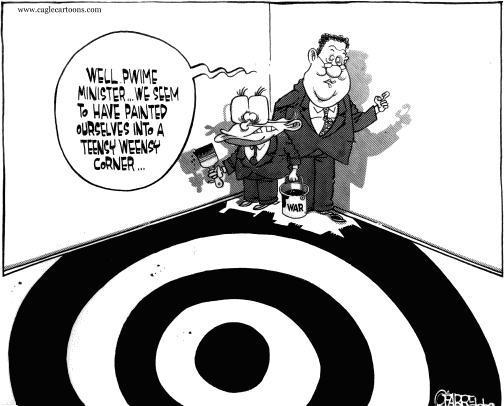Search
Democracy Links
Member's Off-site Blogs
fawn in the usa .....

from the courier mail …..
By Terry Sweetman
December 15
‘Downer no longer has anything to contribute.
One of the more head-shaking TV clips of the week was of Foreign Minister Alexander Downer capering around like a foolish puppy to win an approving pat from US Secretary of State Condoleezza Rice in Washington.
The whole Iraq adventure has gone to hell in a handcart and the best Downer can offer is mock-ocker platitudes about mateship and cheapskate populist politics.
It is difficult not to conclude that our relationship with our major ally is now built on the denial of reality and a fawning desire to give political credibility to a floundering President George W. Bush, who has led his nation through a policy vacuum into a black hole of disaster.
It is the second time in 40 years that I have watched our politicians endeavour to cover the inevitable withdrawal from a lost cause with a smokescreen of misplaced triumphalism, official denial and the cynical and self-serving trumpeting of intellectual and moral righteousness.
It need not have been so because, despite the undeniable parallels with Vietnam, the US did learn much from that bitter experience. The tragedy is that it forgot them so quickly.
Post Vietnam, General Creighton Abrams sought to initiate reforms that were summed up by author Andrew Bacevich as making it harder for the brass to convince their civilian masters to choose the option of war (The New American Militarism: How Americans are Seduced by War, OUP, 2005).
His ideas evolved into what was known as the Weinberger doctrine, after Caspar Weinberger, defence secretary under president Ronald Reagan.
He tried to articulate ``under what circumstances, and by what means, does a great democracy such as ours reach the painful decision that the use of military force is necessary to protect our interests or to carry out our national policy''.
The preconditions he set down were:
- The US should not commit forces to combat unless the vital national interests of the US or its allies were involved.
- They should only be committed wholeheartedly and with the clear intention of winning.
- They should be committed only with clearly defined political and military objectives and with the capacity to accomplish those objectives.
- The relationship between the objectives and the forces committed should be continually reassessed and adjusted if necessary.
- They should not be committed to battle without a ``reasonable assurance'' of the support of US public opinion and Congress.
- The commitment of US troops should be considered only as a last resort.
It has long been obvious to anyone with a brainwave pattern that each one of those simple conditions was ignored to a greater or lesser degree in the decision to go to war in Iraq.
Any vital national interest in Iraq was apparent only if one accepted the always-thin evidence of the weapons of mass destruction and that they somehow posed a threat to the US or its allies.
Under the Donald Rumsfeld theories of warfare, the forces were not committed wholeheartedly and with the clear intention of winning (or more correctly, with a clear idea of what would define victory). It certainly wasn't Bush's ``mission accomplished''.
Forces were committed without clearly defined objectives and the capacity to accomplish those objectives. Any clarity of objectives was never apparent and has become even more hazy with the passing of time.
In those circumstances, there could not be a reassessment of the relationship between the objectives and the size of the forces.
The ``reasonable assurance'' of the public and Congressional support could never have been expected to last for longer than it took to realise the hopelessness and foolishness of the mission.
And, the commitment of US troops was not considered only as a last resort.
They were committed when there was still every possibility of United Nations' approval and, thus, of a real coalition of allies. The Weinberger doctrine segued into the (Colin) Powell doctrine, which made the then ranking general so properly cautious about the 1991 Gulf War.
The tragedy is that because of what can only be defined as moral cowardice, he allowed himself to be traduced into becoming a passenger in this disastrous war.
It was a tragic triumph of ideology over hard-won lessons.
The US will probably re-learn these lessons when the dunces of the Bush Administration are expelled.
However, there is nothing in this week's pathetic performance in Washington to indicate that Australia has learnt very much at all about defining its true national interests. Nor has it learnt very much about the value of sometimes contrary counsel in the context of a mature alliance.
The Bush Administration is bankrupt of policies and we are reduced to panhandlers on a White House corner.
And Alexander Downer no longer has anything to contribute.
The tragedy is that he continues to demonstrate that on a daily basis.’
- By John Richardson at 24 Dec 2006 - 6:48pm
- John Richardson's blog
- Login or register to post comments
Recent comments
2 hours 14 min ago
3 hours 19 min ago
7 hours 44 min ago
7 hours 48 min ago
1 day 2 hours ago
1 day 5 hours ago
1 day 5 hours ago
1 day 8 hours ago
1 day 10 hours ago
1 day 15 hours ago